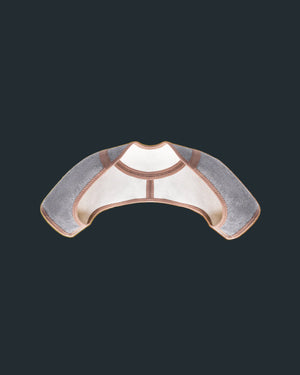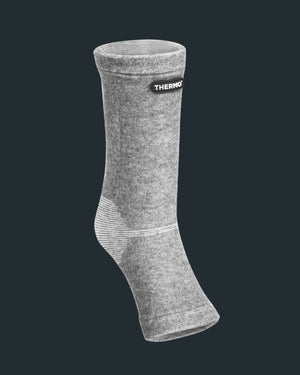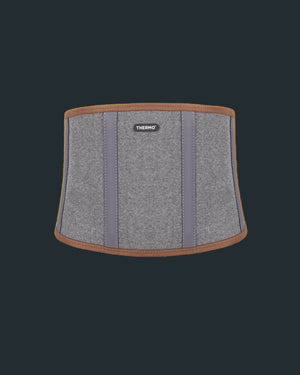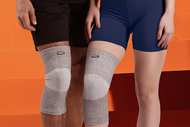Discover how to speed up your recovery with 11 effective methods. Improve muscle recovery, enhance your workouts, and boost overall health.
Whether you're a fitness enthusiast or a professional athlete, understanding how to speed up your recovery after workouts is key to maintaining your performance and health.
This article provides 11 proven methods to enhance your muscle recovery, including the benefits of Thermo Recovery Wear and practical lifestyle changes.
11 Proven Methods to Improve Your Muscle Recovery
Here’s how you can maximize your muscle recovery:
1. Use Thermo Recovery Wear
One of the most efficient, natural, and safe ways to hasten your muscle recovery time is to utilize Thermo Recovery Wear.
Our innovative products have been designed to boost circulation, relieve pain, and reduce inflammation and swelling, providing quicker and more effective outcomes.
What Makes Thermo Recovery Wear Unique?
Our Recovery Wear contains a unique element - semiconductors. These tiny components are embedded into the fabric of the recovery wear and have been demonstrated to reduce chronic muscle and joint pain by over 62%.
With such a significant reduction, your post-workout recovery could be drastically improved, helping you to prepare faster for your next training session.
The Importance of Comfort and Safety
Comfort is key when it comes to recovery wear, and Thermo products have been designed with this in mind.
They are comfortable enough for 24/7 wear, meaning you can continue to gain the benefits even when you're not working out. This continuous support can provide a welcome boost to your recovery process, not to mention the added convenience.
Versatility for Every Lifestyle
Thermo Recovery Wear isn't just a one-size-fits-all solution. The brand offers three different collections designed to fit every lifestyle. Whether working out at home, recuperating from a challenging workout, or recovering from an injury, there's a Thermo product to fit your needs.
This versatility ensures you can tailor your recovery strategy to your specific circumstances, enhancing its effectiveness.
The Power of “The Black Diamond” Fabric
Thermo Recovery Wear employs innovative fabric technology, specifically "The Black Diamond," also known as Bamboo Charcoal Fiber.
This unique material is lauded for its health benefits, including the ability to speed up the recovery process. As an added bonus, it's sustainably sourced, catering to those prioritizing environmental responsibility.
The Potential of Thermo Recovery Wear
The potential benefits of using Thermo Recovery Wear after your workout are extensive. From easing muscle soreness to boosting overall muscle recovery, these products could significantly improve your fitness journey.
Remember, investing in your recovery process is just as important as investing in your active training, and Thermo Recovery Wear could be the tool to elevate your recovery regimen.
2. Prioritize Healthy Foods
What you fuel your body with is crucial to speed up muscle recovery after a challenging workout. The nutrients you consume power your tough workouts and help your muscles repair and grow, reducing muscle soreness.
Protein-Packed Foods
High-quality protein sources are a must in your diet. Protein provides essential amino acids, the building blocks for muscle repair and growth.
You should consume foods like lean meats, eggs, dairy products, legumes, and quinoa. Having some protein before and after your workout can maximize muscle protein synthesis and speed up muscle recovery.
Complex Carbohydrates
Carbohydrates are your primary energy source during intense exercise. Eating a balanced amount of complex carbs such as whole grains, fruits, and vegetables can replenish your glycogen stores, aiding your recovery process.
Omega-3 Fatty Acids
Foods rich in Omega-3 fatty acids, like fatty fish, walnuts, and chia seeds, can help decrease muscle soreness and boost muscle protein synthesis due to their anti-inflammatory properties.
Tart Cherry Juice
Tart cherry juice stands out as a recovery-boosting beverage. Tart cherries' anti-inflammatory and antioxidant properties can help alleviate post-exercise muscle soreness and speed up recovery.
3. Sleep Enough
Restful, quality sleep plays a crucial role in muscle recovery. Our bodies work overtime during sleep to repair muscle fibers damaged during workouts.
This process is facilitated by the pituitary gland, which releases a hormone aiding in tissue growth and repair while we sleep. So, if you're regularly skimping on sleep, you limit your body's ability to recover effectively.
Professional athletes often sleep for 10 hours or more each night, highlighting the importance of sleep in their recovery process. But even if you're not an athlete, aiming to get at least seven to nine hours of sleep each night should be a priority.
Restful routines like listening to relaxing music or practicing mindfulness can further improve your sleep quality. So, always appreciate the power of a good night's sleep to speed up your recovery after an intense workout.
4. Drink Enough Water
Hydration is a key factor in effective muscle recovery. When engaging in any form of intense exercise, the body loses significant amounts of fluid through sweat, and these need to be replaced to maintain optimal bodily functions.
Water helps clear out the metabolic waste products your heavy workouts produce, lubricate your joints, transport energy nutrients, and regulate your body temperature.
Moreover, staying well-hydrated plays a part in preventing muscle cramps and the general sensation of tiredness that could delay your recovery. Drinking lots of water can also contribute to maintaining your body weight, which is an essential aspect of overall fitness and health.
As a general guideline, you should aim to consume at least 8 ounces of water 30 minutes after your workout, even more, if you've sweated profusely. So, keep that water bottle handy during and post-workout, and ensure you're taking in enough fluids throughout the day.
5. Stretch Regularly
Normalizing regular stretching in your fitness routine can be invaluable for speeding up your recovery process. Stretching increases blood flow to your muscles, which boosts nutrient supply and aids in the swift removal of metabolic waste.
This improved circulation can help reduce muscle soreness after a challenging workout, aiding in faster muscle recovery.
Moreover, stretching helps maintain flexibility and range of motion in your joints, enhancing overall performance and reducing the risk of injuries. Some light exercise, including regular stretching, can be a form of active recovery, helping to keep your muscles engaged without overworking them.
Whether it's dynamic stretching before your workout or static stretching afterward, make sure it's a part of your regime. Remember, consistency is key. So stretch regularly, not just when your muscles are sore, and your body will thank you for it.
6. Get a Regular Massage
Regular massages can be a beneficial addition to your muscle recovery routine. They help reduce muscle tension, improve blood flow, and increase the mobility of your muscle fibers. This process can consequently lead to decreased muscle soreness post-exercise.
Massage aids in relieving muscle stiffness and potentially preventing future injuries by breaking up knots in muscles and fascia (connective tissue surrounding muscles). This not only feels good but also helps your muscles recover more efficiently.
Moreover, massages can stimulate the lymphatic system, which aids in the removal of metabolic waste from the muscles. This can further enhance your recovery process.
Even if you can't fit a professional massage into your schedule regularly, self-massage or foam rolling can be effective alternatives. Regardless of how it's achieved, massage therapy can significantly enhance your recovery and overall athletic performance.
7. Get Enough Rest Throughout the Day
While the importance of a good night's rest can't be overstated, it's equally crucial to ensure you're getting adequate rest throughout the day. Your body needs time to heal and recover from the strains of intense workouts, and that doesn't happen solely during sleep.
Taking short, intermittent breaks during your day can help give your muscles essential downtime to repair and grow. These breaks from physical activity enable your body to replenish its energy stores for the next workout.
Furthermore, for those engaging in high-intensity training or endurance exercise, taking a daytime nap can significantly help in muscle recovery. During sleep, your body releases hormones that aid tissue building and repair.
So, while maintaining an active lifestyle is essential, balancing it with sufficient rest periods throughout the day can optimize the muscle recovery process and boost your overall fitness performance.
8. Reduce Stress in Your Life
Reducing stress in your daily life is a significant factor in speeding up muscle recovery. High-stress levels can create a physiological response in your body, potentially impairing muscle recovery and growth.
When you're under stress, your body produces cortisol, a hormone inhibiting various bodily functions, including protein synthesis, a vital muscle repair and growth process. High cortisol levels can also lead to sleep disturbances, further delaying muscle recovery.
Practicing stress-management techniques such as mindfulness, meditation, deep breathing exercises, or any relaxing activities you enjoy can help maintain lower stress levels. Regular physical activity is a great stress reliever, but it must be balanced with adequate relaxation and recovery time.
Remember, a healthier mind contributes to a healthier body, and lowering your stress levels is a significant step to ensure faster and more effective muscle recovery.
9. Try Cold/Ice Baths
Cold or ice baths, also known as cold-water immersion, have long been used by athletes to speed up recovery after intense workouts. The theory behind this practice is that cold water causes your blood vessels to constrict, which reduces blood flow and metabolic activity and helps reduce post-exercise inflammation and muscle soreness.
Once you get out of the cold bath, your tissues warm up again, causing your blood vessels to dilate and increasing blood flow. This process helps flush out metabolic waste products from your muscles, further aiding in your recovery.
Taking a cold bath might seem daunting, but the potential benefits could significantly improve your recovery process. However, remember that individual responses can vary, and listening to your body is essential. As with any new practice, start gradually and assess how your body responds before making it a regular part of your recovery routine.
10. Avoid Overtraining
While pushing yourself in workouts is essential, it's equally crucial to avoid overtraining. Training too hard without sufficient time for recovery can lead to many issues, including excessive muscle soreness, decreased performance, injuries, and even suppressed immune function.
When it comes to working out, more isn't always better. Training hard is important, but your muscles need time to repair and grow stronger in response to the stresses you've placed on them.
If your body is constantly strained by intense workouts without adequate recovery, the muscle damage will accumulate rather than heal, hindering your progress.
Listening to your body is key. If you're experiencing prolonged muscle soreness, extreme fatigue, drops in performance, or loss of motivation, these may be signs of overtraining.
Balance your challenging workouts with lighter exercise days, and make sure to include rest days in your training schedule.
11. Avoid Drinking and Smoking
Adopting a healthy lifestyle plays a crucial role in enhancing your muscle recovery, and this includes avoiding harmful substances like alcohol and tobacco. Both drinking and smoking can negatively impact your recovery process and overall fitness performance.
Alcohol can interfere with muscle recovery by inhibiting various bodily processes. It dehydrates your body, disrupts your sleep patterns, and can inhibit protein synthesis, a crucial process required for muscle growth and repair.
Studies also suggest that alcohol can increase muscle soreness and inflammation, further delaying the recovery process.
Smoking has similar detrimental effects. It reduces the blood flow in your body, depriving your muscles of the oxygen and nutrients they need for recovery. Smoking can also damage the lungs, making it harder to perform cardio workouts and hindering overall athletic performance.
Avoiding or quitting smoking and limiting alcohol consumption will not only speed up your recovery times but also enhance your overall fitness levels and significantly improve your health in the long term.
Final Words
Implementing these 11 proven strategies, from prioritizing healthy foods to avoiding overtraining, will significantly enhance your muscle recovery and overall fitness performance.
Noteworthy is the remarkable impact of Thermo Recovery Wear in speeding up muscle recovery naturally and effectively.
Now that you've understood how to speed up your recovery, it's time to put this knowledge into practice. Start your improved recovery journey today with Thermo Recovery Wear. Discover our innovative product range and elevate your fitness game.






